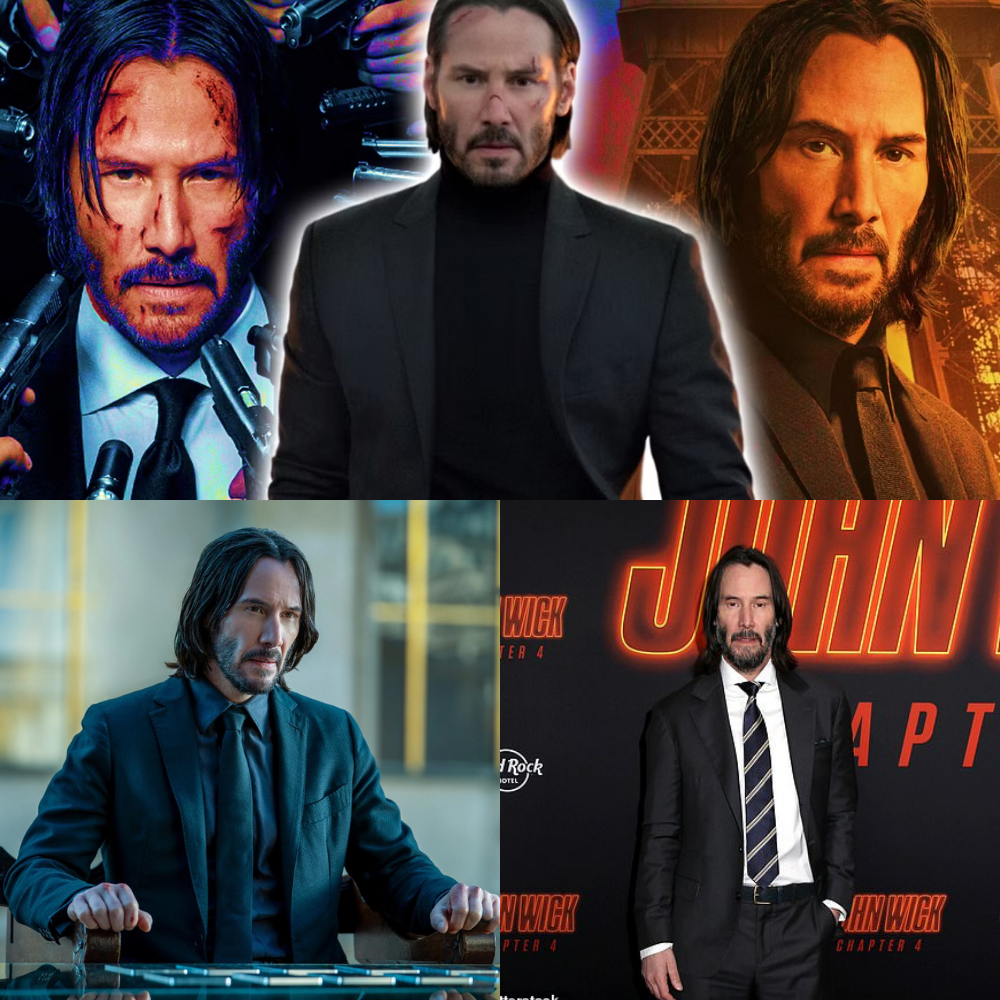
In the annals of Hollywood history, few films have redefined the action genre as profoundly as John Wick. Released in 2014, the movie introduced audiences to a stoic, relentless hitman portrayed by Keanu Reeves, whose quest for vengeance over the death of his dog sparked a cultural phenomenon. Today, the John Wick franchise is a billion-dollar juggernaut, celebrated for its sleek choreography, intricate world-building, and Reeves’ magnetic performance. But what many fans may not know is that the film was nearly called Scorn—a title that could have doomed it to obscurity. Thanks to a serendipitous blunder by Keanu Reeves himself, the movie was rechristened John Wick, a name that became synonymous with cinematic excellence. This is the story of how a simple mistake transformed a generic action flick into a global sensation.
The Birth of Scorn
When screenwriter Derek Kolstad first penned the script for what would become John Wick, he envisioned a gritty revenge thriller about a retired assassin drawn back into the underworld. The protagonist, named after Kolstad’s maternal grandfather, was always called John Wick. However, the film’s working title was Scorn, a word that evoked the bitterness and vengeance driving the story. At the time, Scorn seemed like a fitting choice for a tale of a man scorned by fate, seeking retribution for the loss of his last connection to his late wife—a puppy named Daisy.
The script for Scorn caught the attention of producer Basil Iwanyk, who saw potential in its lean narrative and intense action. However, the project faced significant hurdles. Keanu Reeves, whose career had hit a rough patch after disappointments like 47 Ronin and Man of Tai Chi in 2013, was intrigued by the script’s emotional depth and the opportunity to redefine himself as an action star. He signed on to play the lead, but the film struggled to secure studio backing. Many executives dismissed it as just another low-budget action movie, and a test screening for acquisition executives was a disaster, with one viewer walking out early. Lionsgate Films eventually picked up the project, but with minimal commitment, suggesting a straight-to-video release was likely.
As production ramped up, the team focused on crafting a visually distinctive film. Directors Chad Stahelski and David Leitch, both seasoned stunt coordinators from The Matrix, brought their expertise to create the film’s now-iconic “gun-fu” choreography. Reeves threw himself into the role, training rigorously to perform his own stunts and embodying the quiet intensity of John Wick. Yet, amidst the chaos of production, one unexpected factor began to shape the film’s identity: Keanu Reeves’ inability to remember the title Scorn.
Keanu’s Accidental Marketing Genius
During pre-production and early promotional efforts, Reeves began referring to the film as John Wick in interviews and conversations. Whether it was a genuine lapse in memory or an intuitive preference for the character’s name, Reeves’ mistake proved to be a stroke of brilliance. The marketing team at Lionsgate noticed that his repeated mentions of John Wick were generating buzz. Fans and media outlets latched onto the name, intrigued by the mystique of this new character played by the beloved star of The Matrix and Speed. Estimates suggested that Reeves’ slip-ups were worth millions in free publicity, a godsend for a film with a modest $20–$30 million budget.
The decision to change the title was not without debate. Kolstad initially saw Scorn as a reflection of the film’s emotional core, but he quickly recognized the power of John Wick as a title. Unlike Scorn, which blended into the crowded landscape of one-word action movie titles like Crank, Shooter, or Payback, John Wick was unique and personal. It posed a question: Who is John Wick? The name carried an air of enigma, promising a character-driven story rather than a generic revenge plot. It also leveraged Reeves’ star power, signaling to audiences that this was a role worthy of his iconic status.
Lionsgate executives, particularly Jason Constantine and Tim Palen, championed the title change, seeing it as a way to differentiate the film in a competitive market. By the time John Wick hit theaters in October 2014, the new title had already sparked curiosity, drawing audiences eager to discover the man behind the name. The gamble paid off: the film grossed over $88 million worldwide against its modest budget and earned an 86% approval rating on Rotten Tomatoes, with critics praising its style, action, and Reeves’ commanding performance.
Why John Wick Worked (and Scorn Wouldn’t Have)
The title John Wick did more than just attract attention; it shaped the film’s identity and laid the foundation for a franchise. A title like Scorn might have worked for a standalone revenge thriller, but it lacked the versatility to sustain a series. Imagine sequels titled Scorn: Chapter 2 or Scorn: Parabellum—they sound clunky and uninspired. In contrast, John Wick became a brand, instantly recognizable and tied to the character’s mythic presence in the criminal underworld. The name evokes fear and respect, as seen in the films’ dialogue, where characters whisper “Baba Yaga” or “The Boogeyman” when speaking of Wick.
The title also aligned perfectly with the film’s world-building. John Wick introduced audiences to a richly detailed universe of assassins, governed by rules and institutions like the Continental Hotel and the High Table. Naming the film after its protagonist emphasized his centrality to this world, making him a legend whose reputation precedes him. Scorn, while thematic, would have shifted focus to the emotion of the story, potentially limiting its scope to a single tale of vengeance. By contrast, John Wick invited exploration of the character’s past, his relationships, and his place in a larger narrative tapestry.
Reeves’ influence extended beyond the title. His collaboration with Kolstad and the directors shaped the film’s tone and character development. He insisted on keeping the story focused on John’s emotional journey, rejecting suggestions to add unnecessary subplots like a murdered family. His commitment to authenticity—training for months to master martial arts and firearms—elevated the action sequences, making them feel visceral and grounded. Reeves’ stoic yet soulful performance gave John Wick a depth that resonated with audiences, turning him into a cultural icon.
The Ripple Effect: A Franchise Is Born
The success of John Wick in 2014 was a surprise to many, but it was no fluke. The film’s blend of stylish action, emotional stakes, and a captivating lead character struck a chord, paving the way for three sequels and multiple spin-offs. John Wick: Chapter 2 (2017), Chapter 3 – Parabellum (2019), and Chapter 4 (2023) expanded the franchise’s scope, taking Wick from New York to Rome, Morocco, and Paris. Each film built on the mythology of the first, introducing new characters like Winston (Ian McShane), Charon (Lance Reddick), and the Bowery King (Laurence Fishburne). The franchise has grossed over $1 billion globally, a feat unimaginable for a film once destined for home video.
The upcoming spin-off Ballerina (set for release in June 2025), starring Ana de Armas, further demonstrates the franchise’s staying power. Set between Parabellum and Chapter 4, it features Reeves reprising his role, alongside returning cast members like McShane and Reddick. The John Wick name has become a seal of quality, guaranteeing high-octane action and a compelling story. A prequel series, The Continental, and potential future projects like a fifth film underscore the title’s enduring appeal.
Had the film remained Scorn, it’s unlikely it would have achieved this level of success. A generic title could have relegated it to the bargain bin of forgettable action movies, overshadowed by bigger releases. Instead, John Wick stood out, its title sparking conversations and inviting audiences to discover a new kind of action hero. Reeves’ accidental renaming gave the film a unique identity, one that resonated with fans and critics alike.
Keanu Reeves: The Heart of John Wick
Keanu Reeves’ role in the John Wick saga goes beyond acting. His passion for the project, from script development to stunt work, breathed life into the character and the franchise. His mistake in calling the film John Wick was a happy accident, but it reflected his deep connection to the role. Reeves saw John Wick not just as a character, but as a symbol of resilience and redemption—a man who, despite immense loss, fights on. This understanding informed his performance and, inadvertently, the film’s marketing.
Reeves’ status as a Hollywood icon also played a crucial role. Known for his humility and dedication, he brought a level of authenticity to John Wick that few actors could match. His previous roles as Neo and Ted “Theodore” Logan had cemented his place in pop culture, and John Wick promised a new chapter in his storied career. The title capitalized on this, positioning the film as a must-see event for fans eager to see Reeves return to form.
A Legacy Built on a Mistake
As John Wick approaches its tenth anniversary, its impact on the action genre is undeniable. The franchise has inspired countless imitators, from Atomic Blonde to The Equalizer, but none have matched its blend of style, substance, and heart. The story of how it became John Wick is a testament to the power of serendipity in filmmaking. A single actor’s slip of the tongue, combined with a savvy marketing team, turned a potential flop into a cultural touchstone.
The next time you watch John Wick dispatch enemies with surgical precision or navigate the shadowy halls of the Continental, take a moment to appreciate the unlikely journey of its name. Without Keanu Reeves’ forgetfulness, the world might never have met the Baba Yaga. Instead, we have a franchise that continues to thrill, surprise, and inspire—a legacy built on a mistake that turned out to be exactly right.



